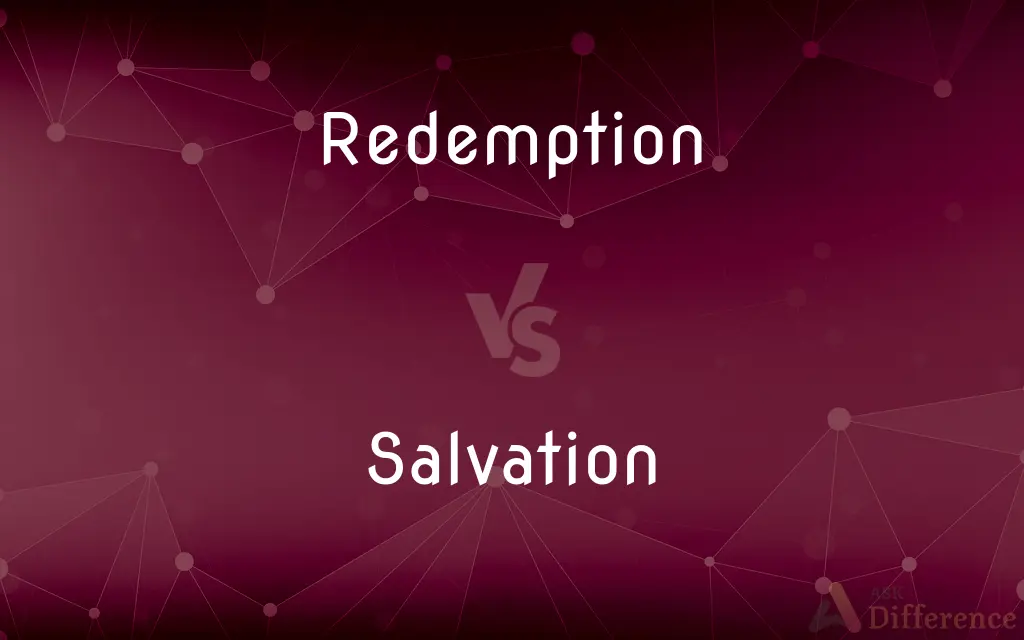Redemption vs. Salvation — What's the Difference?
By Maham Liaqat & Fiza Rafique — Updated on March 15, 2024
Redemption primarily involves the act of being saved from sin, error, or evil through atonement, while salvation is the broader concept of being saved or delivered from harm, often emphasizing a spiritual or eternal rescue.

Difference Between Redemption and Salvation
Table of Contents
ADVERTISEMENT
Key Differences
Redemption is a specific theological term that focuses on the process of atoning or making amends for one's sins or errors, often implying a transactional aspect where something is given in exchange for freedom from sin. It carries a connotation of recovery or restoration to a state of grace or moral integrity, typically within a religious context. Salvation, on the other hand, encompasses a wider range of meanings including being saved from sin, but extends to general deliverance from any form of danger, suffering, or harm. It signifies the act of being protected or liberated, with a strong emphasis on spiritual salvation from the consequences of sin and eternal damnation.
While redemption is about the method or process through which atonement is achieved, salvation refers to the end state or condition of being saved. Redemption can be seen as a step or pathway towards achieving salvation, which is the ultimate goal of being rescued or delivered from sin and its penalties. The concept of salvation is more encompassing, including ideas of health, well-being, and preservation, beyond the spiritual and moral implications of redemption.
In many religious traditions, redemption is often discussed in the context of sacrifice or payment that satisfies the demands of justice or divine law, allowing individuals to be reconciled with God. Salvation, while it includes redemption, also encompasses the broader themes of God’s mercy, grace, and the promise of eternal life. It is the comprehensive term that describes the entire process and result of being saved, not only from sin but from all forms of peril, including physical danger.
The distinction between redemption and salvation highlights the complexity of theological concepts concerning human sin, divine justice, and mercy. While redemption has a more focused meaning, centered around atonement and the restoration of relationships, salvation offers a broader perspective on the human condition, emphasizing ultimate deliverance and the hope of a future free from suffering.
Comparison Chart
Focus
Atoning or making amends for sins
Being saved from sin, danger, or harm
ADVERTISEMENT
Scope
Specific process of atonement
Broad concept of deliverance and protection
Context
Often religious, implying a transactional aspect
Religious and beyond, emphasizing spiritual rescue
Outcome
Restoration to a state of grace or integrity
Ultimate protection or liberation, including eternal life
Associated Ideas
Sacrifice, payment, reconciliation with God
Mercy, grace, eternal promise, comprehensive rescue
Compare with Definitions
Redemption
Implies a recovery or restoration.
Through acts of kindness and penance, he sought redemption for his past wrongdoings.
Salvation
Encompasses deliverance from danger or suffering.
The rescue operation was their salvation from the stranded island.
Redemption
Focused on moral and spiritual integrity.
She viewed charity work as a path to personal redemption.
Salvation
Emphasizes spiritual or eternal rescue.
His faith in divine mercy became his path to salvation.
Redemption
The act of being saved from sin through atonement.
The concept of redemption is central to many religious faiths, where it signifies the process of returning to a state of moral purity.
Salvation
Comprehensive term for ultimate deliverance.
The central message of many religions is the pursuit of salvation for their followers.
Redemption
Often involves sacrifice or payment.
In Christian theology, Christ's sacrifice on the cross is seen as the ultimate act of redemption for humanity's sins.
Salvation
Includes broader themes of mercy and grace.
The doctrine of salvation by grace teaches that divine mercy is the foundation of faith.
Redemption
Transactional aspect of being reconciled with God.
Redemption in many religions involves rituals or sacraments that symbolize atonement and forgiveness.
Salvation
The state or act of being saved from harm, especially spiritual harm.
Salvation, in religious contexts, offers deliverance from the consequences of sin and the promise of eternal life.
Redemption
The payment of an obligation, as a government's payment of the value of its bonds.
Salvation
Salvation (from Latin: salvatio, from salva, 'safe, saved') is the state of being saved or protected from harm or a dire situation. In religion and theology, salvation generally refers to the deliverance of the soul from sin and its consequences.
Redemption
The act of redeeming or the condition of having been redeemed.
Salvation
Preservation or deliverance from destruction, difficulty, or evil.
Redemption
Recovery of something pawned or mortgaged.
Salvation
A source, means, or cause of such preservation or deliverance.
Redemption
Deliverance upon payment of ransom; rescue.
Salvation
Deliverance from the power or penalty of sin; redemption.
Redemption
(Christianity) Salvation from sin through Jesus's sacrifice.
Salvation
In religions such as Hinduism and Buddhism, deliverance from the cycle of rebirth and suffering.
Redemption
The act of redeeming or something redeemed.
Salvation
The agent or means that brings about such deliverance.
Redemption
The recovery, for a fee, of a pawned article.
Salvation
(religion) The process of being saved, the state of having been saved (from hell).
Collective salvation is not possible without personal salvation, but the latter is achievable.
Redemption
Salvation from sin.
Salvation
The process of being restored or made new for the purpose of becoming saved; the process of being rid of the old poor quality conditions and becoming improved.
Redemption
Rescue upon payment of a ransom.
Salvation
(rare) To save, in the religious sense; to bring to salvation.
Redemption
(Christianity) the act of delivering from sin or saving from evil
Salvation
The act of saving; preservation or deliverance from destruction, danger, or great calamity.
Redemption
Repayment of the principal amount of a debt or security at or before maturity (as when a corporation repurchases its own stock)
Salvation
Saving power; that which saves.
Fear ye not; stand still, and see the salvation of the Lord, which he will show to you to-day.
Redemption
The act of purchasing back something previously sold
Salvation
(Christianity) the act of delivering from sin or saving from evil
Salvation
A means of preserving from harm or unpleasantness;
Tourism was their economic salvation
They turned to individualism as their salvation
Salvation
The state of being saved or preserved from harm
Salvation
Saving someone or something from harm of from an unpleasant situation;
The salvation of his party was the president's major concern
Common Curiosities
How do different religions view redemption and salvation?
Different religions have unique perspectives on redemption and salvation, but many share the common themes of atonement, divine mercy, and the promise of an ultimate deliverance from sin and its consequences.
Is salvation only a religious concept?
While salvation is predominantly used in religious contexts to refer to spiritual deliverance, it can also apply to general situations of being saved from danger or harm.
How do concepts of redemption and salvation influence moral behavior?
The concepts of redemption and salvation can significantly influence moral behavior, encouraging individuals to seek atonement, live virtuously, and strive for a state of grace or spiritual enlightenment.
Can one achieve salvation through good deeds alone?
Views on achieving salvation through good deeds vary among religious traditions. Some emphasize faith and divine grace as the primary means of salvation, while others consider good deeds as essential to demonstrating faith and contributing to salvation.
Can salvation be lost once achieved?
Views on whether salvation can be lost vary among religious and theological perspectives, with some traditions arguing that salvation is secure upon genuine faith or conversion, while others believe it can be jeopardized by subsequent sins or loss of faith.
How do redemption and salvation relate to divine justice and mercy?
Redemption and salvation are deeply intertwined with concepts of divine justice and mercy, reflecting the balance between the consequences of sin, the need for atonement, and the offer of forgiveness and protection through divine grace.
What is the difference between redemption and salvation?
Redemption is specifically about being saved from sin through atonement, while salvation is a broader concept that encompasses being saved from both sin and other forms of harm, offering ultimate deliverance and protection.
What role does faith play in redemption and salvation?
Faith often plays a crucial role in both redemption and salvation, serving as the foundation for trusting in the process of atonement and the promise of ultimate deliverance and protection.
Are redemption and salvation immediate or ongoing processes?
In many religious traditions, redemption and salvation are viewed as ongoing processes that involve continual growth, faith, and adherence to spiritual principles, culminating in the ultimate goal of eternal life or enlightenment.
Can redemption exist without salvation?
Redemption is often considered a step towards salvation, focusing on atonement and reconciliation with God, but it is part of the broader process and goal of achieving salvation.
Share Your Discovery

Previous Comparison
Deserve vs. Earn
Next Comparison
Slacks vs. PantsAuthor Spotlight
Written by
Maham LiaqatCo-written by
Fiza RafiqueFiza Rafique is a skilled content writer at AskDifference.com, where she meticulously refines and enhances written pieces. Drawing from her vast editorial expertise, Fiza ensures clarity, accuracy, and precision in every article. Passionate about language, she continually seeks to elevate the quality of content for readers worldwide.
















































